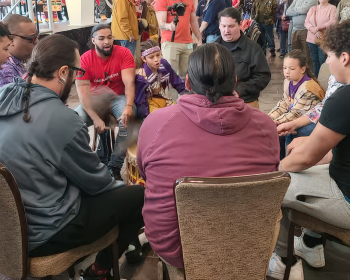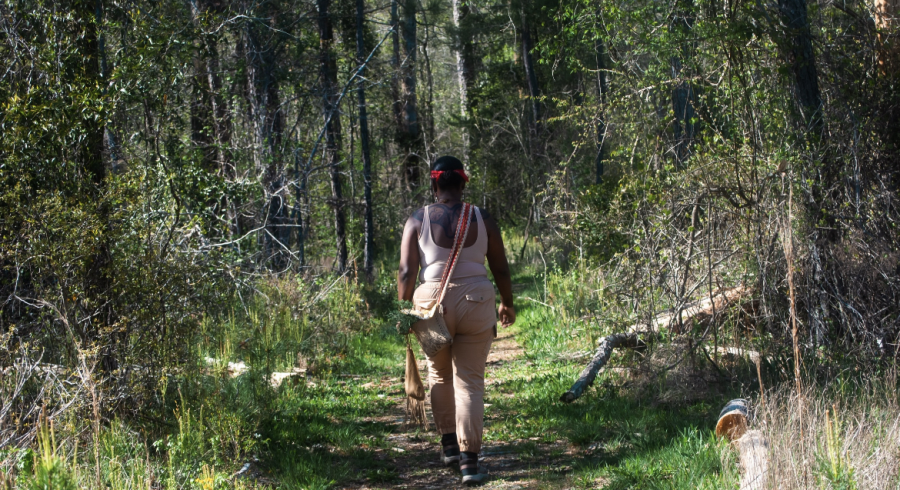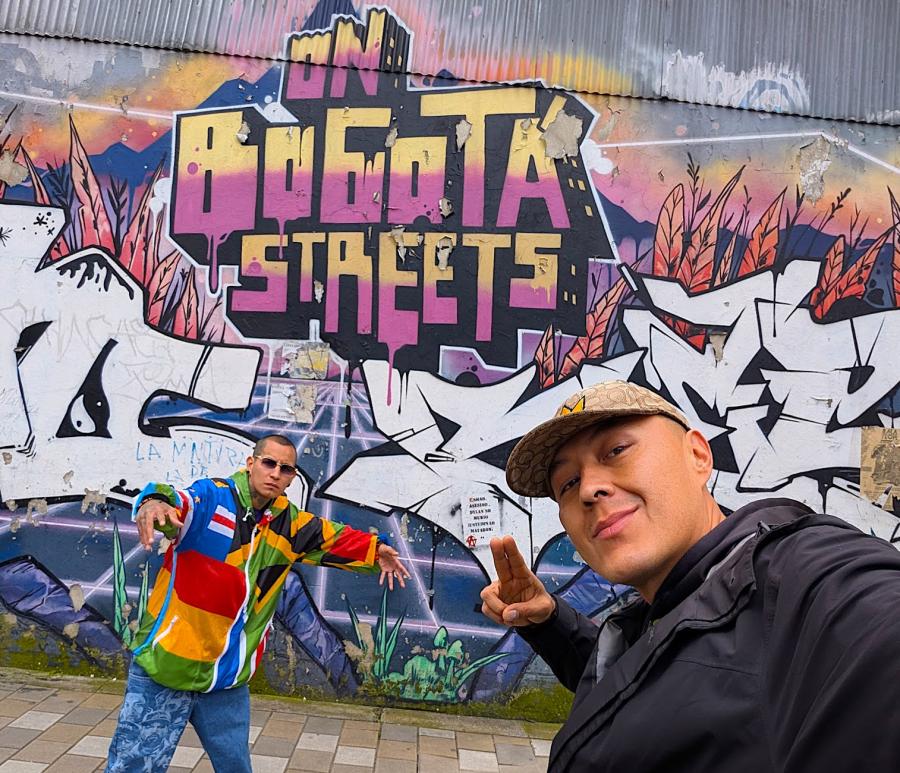Lilikala Kame’eleihiwa has seen the effects of the U.S. invasion of Hawai’i spread and intensify throughout her lifetime, and now works to educate the younger generation about Native Hawai’ian culture and the challenges it faces. She is the director of the Center for Hawai’ian Studies at the University of Hawai’i at Manoa. Leiali’i Mano’i was born and raised in Honolulu and received her bachelor’s degree from the University of Hawai’i. She is a hula dance and is currently working on a degree in Pacific Island Studies. Here, Kame’eleihiwa and Mano’i discuss what they see as the greatest issues facing their peers today.
Cultural Survival Quarterly: What are the most important issues facing Native Hawai’ians?
Leiali’i: The issues that Native Hawai’ians have been dealing with are basically getting our sovereignty back, which means regaining our right as a people to live the way we want and having our land back.
There is also the problem of the U.S. military in Hawai’i. We have the center for the U.S. Navy Pacific Fleet, and so we always have live bombs going off. They just started bombing again on Oahu, where the majority of the people live. They are bombing valleys and areas that are sacred to us—which is just a horrible thing. There isn’t enough land for us to live and thrive off of, yet they can use that same land to test bombs.
Lilikala: It’s paradise! Go to paradise and do live fire bombing! The United States controls at least half of the North American continent. Could they not do live fire bombing over there? Then they say they are in Hawai’i because they need to have our military prepared, so our boys can get around the world faster when a conflict breaks out. Well, then I say that they need to invest in the Concord. But so far, there is nothing we can do about it.
Leiali’i: There also are places where we know there is radioactive waste. There is no need for that to be there. Pearl Harbor used to be a thriving flourishing community and environment. Now the water is so polluted and so contaminated, hardly anything can grow there. The military recently handed over the island of Kaho’olawe. It had used the island for years and years for live target practice. The island now is so deteriorated hardly anything can grow. There also are sacred sites which Hawai’ians do not have access to now because the military is controlling them.
CSQ: What level of consciousness exists about these issues among your peers?
Leiali’i: I first started becoming conscious of all that was happening in high school. My high school Hawai’ian language teacher would bring us information about the bombing and land issues. She was the one who really got me started—she opened our eyes to see what was really going on. The political interest started for me when I came to the University of Hawai’i in 2001. I started really putting myself out there as an advocate.
Because I am a hula dancer, culture is important to me. I used to keep culture and politics separate, but the more I learned, the more I realized I could not keep them separate. As a hula dancer I need to have the right to go into the mountains to pick the materials I need to make my costumes. I need to be in that realm when I am dancing so I know what I am dancing about. Now I can’t be in those areas because the military or the state has control over them and we are not allowed to enter. When I can’t practice my cultural rights, then something is wrong.
Lilikala: Hula dancers organize protest marches these days, especially around the issues of gathering rights. According to the law that came to us from the King of Hawai’i before the American military invaded, Hawai’ians had the right to go to the mountains and to the sea to gather. Everything was communal. Only the gods owned the land and the ocean. There are some things you need from the mountains and some things you need from the sea. So access to those are important. Some people who have a lot of private property go crazy about gathering rights. They tried, several years ago, to organize at the legislative level to take away our gathering rights because it was a threat to their private property. The hula dancers organized and held a 24-hour vigil. They brought in the drums, and danced and hula-ed and chanted, and the bill died. That was the end of it because people were so outraged.
The bombing has been happening in Hawai’i my entire life. The military decided it wanted Pearl Harbor back in the 1870s, so they started to work toward getting their foot in over there. Sugar planters helped them, as well as missionary descendants who had become sugar planters. A sugar planter named Charlie Bishop, who was married to a Hawai’ian high chiefess, invited them. He became minister of foreign affairs in 1873, and it was his idea that we could negotiate favorable markets in America if the American military came to Hawai’i. He wanted to do away with the tax he was charged when he sold sugar to the United States. It did not benefit the Hawai’ian people at all, and when the Hawai’ians heard about this they started to riot. The king said no, we mustn’t invite the military. The chiefess who married Bishop said that this was the only time she ever fought with him.
So the military came to Hawai’i for strategic purposes, and for America to become an imperial power in the Pacific, like the British and the French. It was about status, and still is. But the reason we became a part of the United States without a treaty and without a vote was that in 1898, the Spanish American War broke out. The military said it needed Pearl Harbor in order to get to the Philippines. So Hawai’i was taken illegally according to international law by a joint resolution in the U.S. House of Representatives and Senate. The military just started pouring into Hawai’i, and the military bases grew exponentially during World War I and World War II.
In Hawai’i we have live fire bombing, we have toxic waste, we have Agent Orange buried in our water sources. The military doesn’t have to answer for any of the toxic waste that they dump into our water systems. We drink the toxic waste, we breathe it.
Nuclear submarines are kept in Pearl Harbor, which makes us a first-strike target. The water that cools the nuclear reactors is stored near the Honolulu International Airport—it’s a disaster waiting to happen.
CSQ: How has this environmental damage affected your lives?
Leiali’i: Native Hawai’ians are dying. We have high rates of heart disease and diabetes. All of these non-communicable diseases have been introduced because of a new lifestyle. We are dying because we no longer have our land which provided our food sources. That needs to stop. I see my father’s generation—he is getting sick, and he’s only 55.
Lilikala: When I was a kid you could drink the water, but now you can’t even swim in freshwater streams because there is leptospirosis, which could make a person fatally ill. The reef used to be our refrigerator. We’d walk on it and get fish and shellfish and seaweed to eat. Now it’s so polluted you can’t find fish. My daughter is 21. When she was about five years old, she saw a fish swim by and she started to scream and yell, “Mom, there’s a fish, there’s a fish in the water!” This is Hawai’i, we were out on the beach, there should be many fish there. I thought, “Oh, how things have changed since I was a child.”
Hawai’ians are a water people. We live on the ocean and we love the ocean. We are great sailors who would sail across the whole Pacific with just the moon and the stars to guide us. I would say less than 10 percent of Hawai’ians own any ocean-front property today. We don’t have access to ocean, which makes us unhealthy. Our oceans, when we do get there, are so polluted you can’t eat from them. When we eat fish we are ingesting a high degree of mercury, because our fish are so polluted. These are real challenges.
When my daughter-in-law was pregnant she refused to eat any fish because there was a mercury warning. I eat fish any way I can get it. If I am going to die of mercury poisoning, that’s okay. But she was worried about harming her child. How wonderful of her to think of that, but for us who love fish so dearly, how difficult a choice for her.
CSQ: What are your feelings about the Akaka Bill [see page 32 this issue]?
Lilikala: We would prefer to have a bill that is better than what the Alaska Natives got. Alaska Natives did better than the Natives in the lower 48 states. We hoped that with time we would see is a more enlightened government dealing with Natives. The Akaka Bill does not even give us what the Alaska Natives got.
I thought the second version was fairly palatable because it allowed us to make our own government and negotiate land over time. The third version, which came out this year, puts a 20-year cap on negotiating land. The United States has been abusing our land for over 100 years—20 years to undo 100 years of harm is much too short. The other problem with this bill is that the federal government will decide who is Hawai’ian and who is not. I am a genealogist. I can tell you who my ancestors are going back 100 generations. I don’t think anyone in Washington, D.C., knows as much about that as I do.
Leiali’i: I am afraid to see what will happen and what we’ll lose out on if the current version of the Akaka Bill passes. They have changed it three times already without involving Native Hawai’ians. I’m just afraid if that bill is impressed upon us we would lose our opportunity for full sovereignty. And sovereignty is what I see as the ultimate goal—if we don’t get that, we don’t get anything.
Lilikaka: Federal Recognition is a tricky thing. I have been a great supporter of the Akaka Bill because I support federal recognition. But I absolutely cannot support the last draft of the Akaka Bill. The American government is lies, they break treaties. Dealing with the American government is like dealing with the devil. Federal recognition may give us some relief in court, because we are worried that some of the land and money set aside for Hawai’ians will be disbanded if we are not a federally recognized tribe. Land and money are a worry because Native Hawai’ians make up a majority of the homeless, have the shortest life expectancy, and have the highest rate of infant mortality. We face real challenges, so we don’t want to lose anything. Federal recognition is something we have to deal with on one level or another with the American government.
I’m not worried about federal recognition stopping us from going forward with independence because even if we gained independence tomorrow we would have a hard time. There are only 400,000 Hawai’ians. If we each had 10 babies, then we’d have no problem—that’s when I’d push for independence. I think that the American government should not have the final say. That’s why we go to the United Nations. It does not matter what the federal government says it wants to do with us, or what we might agree to or what some of us might agree to. There is a strong independence movement going on that does not talk about federal recognition at all.
Leiali’i: I think the state of Hawai’i should no longer be the State of Hawai’i. It should be Hawai’i, and that’s it. Native Hawai’ians who live in Hawai’i should have a say when it comes to dealing with international law with the United States. Hawai’ians should have a right to say what goes on with their land, and what goes on with their traditional knowledge and the way it’s represented. Many people only know about Hawai’i from the Disney movie Lilo and Stitch, which is a horrible movie.
CSQ: How is life for you as women in Hawai’i?
Lilikala: In Hawai’i we think that all issues are women’s issues. We actually expect that men will obey us when we tell them what to do. So we are in a different position than most women around the world. I just have to thank our Hawai’ian ancestors for making our lives so good. When I hear what happens to the women around the world, I think, my God, how can humans treat the women who give birth to them in such a poor manner? I am shocked by it.
It gives me more incentive to write about our goddesses. We have over 40,000 gods and over half are female. It gives me strength and energy to write about our culture and our history, who we were, why we do the things we do, and to make sure that our enlightened view of women continues on into the future. We have a goddess called Haumea, the goddess of childbirth, politics, and war. We are told how Haumea is reborn in every generation, so we are all a little Haumea. That inspires us to do great things. I believe that it is only lack of clarity that stops us from making miracles.
Leiali’i: What I’ve found, especially among my classmates, is that the younger generation of men are strong supporters of Hawai’ian women. They will do anything they need to do.
CSQ: What are your hopes for the future?
Lilikala: I seek to find peaceful ways to resolve our challenges. That’s why I bring students to the United Nations every year. It is important for Leiali’i’s generation to know how the system works, to take up the mantle and carry on.
When the United Nations was formed in 1945, countries got together and were supposed to decolonize the territories that they had taken. Hawai’i was an independent kingdom. We were our own country. So we were on the list to decolonize. But every year the United States would go to the United Nations and say that Hawai’i and Alaska don’t want to be decolonized. They never offered us a chance to decolonize. We’re living in the belly of the beast and we don’t know what to do about it. So I like to come to the United Nations just to say what was not said from 1947 to 1959, when Hawai’i became a state. I would like to say, “Here we are as Hawai’ians. We want to decolonize, and we want our country back.” And we will say it over and over and over again now that we are in the door. It’s going to go on forever because I have grandchildren.
In 1898, when the U.S. Congress decided they wanted Pearl Harbor for the Spanish American War, 95 percent of Hawai’ians signed petitions against it. Those petitions were subsequently lost. When the United States took over, not only was our language banned, but we knew nothing about our history or how we became part of America. In 1998, a Hawai’ian woman who was finishing her doctorate in political science went to the Smithsonian Institute and found these petitions. She brought a copy home, and it was the hottest selling thing at Kinko’s copy shop. Everyone wanted to find their families on the petition. What we learned from that is that the reason we are such activists is that’s what our ancestors were like. Activism is in our blood, and it will always be there.
Leiali’i: If I didn’t have hope I wouldn’t be involved, and I wouldn’t come to the United Nations. Last night I really contemplated: if I want peace, if I want Hawai’i to be an independent nation, if I want Hawai’ians to live, if I want the people of the Pacific to live, if I want indigenous people around the world to live, then I need to make the commitment to be at the United Nations year after year until we make a difference.
Lilikala: When we spark that next generation, it really doesn’t matter what happens to us. We can drop dead tomorrow, but the next generation will carry on. So we are not going to go away. There are 350 million indigenous people all over the world who feel the same way. This issue will have to be resolved in order to have peace in this world.
Tara Tidwell Cullen is the managing editor of Cultural Survival Quarterly



